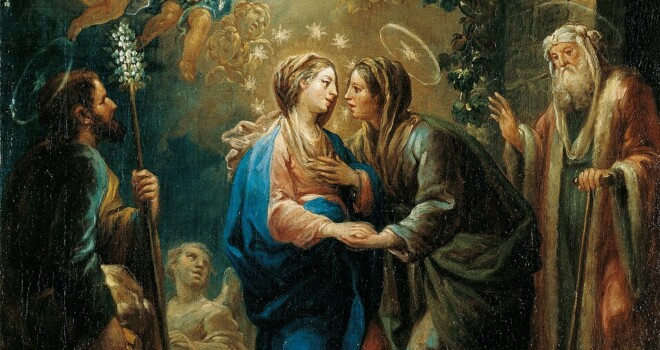On May 31st, the Church celebrated the Visitation of the Blessed Virgin Mary to her relative, Elizabeth, as described in the Gospel of Luke. This year, I was struck by a way that I was able to join Mary in her ministry through my own practice of the apostolate of visiting.
Luke describes that soon after the Archangel Gabriel appeared to Mary, announcing that she would become the mother of Jesus, she went out “in haste” to visit Elizabeth, having learned from Gabriel that she was expecting a baby although past the age of childbearing. Although Elizabeth lived some distance away, Mary was completely unconcerned for herself, and only thought of helping her cousin. Mary’s promptness in going to see Elizabeth teaches us to put the needs of our neighbor ahead of our own and that the act of visiting someone has great value.
Mary, pregnant with Jesus, brought Him to Elizabeth and Zechariah. As soon as Mary greeted Elizabeth, her baby, St. John the Baptist, “leaped in her womb,” recognizing the presence of Jesus in Mary’s womb. Elizabeth “filled with the Holy Spirit,” also realized that she was in the presence of the Lord and called Mary, “The mother of my Lord,” showing that she was honored by her visit. Furthermore, she praised Mary for her faith, saying, “Blessed are you who believed that what was spoken to you by the Lord would be fulfilled” (Lk. 1:45). Mary responded with her canticle, the Magnificat, a prayer of praise to God for all that He had done for her and the people of Israel. While much of Mary’s prayer is about her own relationship with God and her gratitude to Him, it is also a prayer about His greatness and mercy. We too, can pray with Mary: “My soul proclaims the greatness of the Lord; my spirit rejoices in God my Savior . . . The Mighty One has done great things for me” (Lk. 1:46–47, 49).
Mary’s visitation is one of my favorite stories in the Gospels and one of my favorite mysteries of the Rosary. I relate to the visitation because I have an apostolate of visiting senior priests in nursing homes. My visits bring me great joy as I am able to spend time with holy men who love God and have served Him faithfully in their vocation for many years. During my visits, I hope to bring Jesus’ love and peace to the priests. I listen to them, tell them what is happening in my life, sometimes asking for spiritual advice, and pray with them.
My experience of spending time in nursing homes has showed me that there are many people in need of visits. Visiting others is an important apostolate as we can help people experience God’s love through our kindness to them. Like Mary, we can bring Jesus to others. We can do this by receiving Jesus frequently in Holy Communion, staying in a state of grace so that the Holy Trinity can dwell within us, and by praying for the people we visit.
We can bring Mary with us on our visits too. We can ask her to help the person we are visiting and to help us during our time with him or her. Just as Mary prayed her Magnificat, we can make prayer a part of our visit. The Rosary is an especially good prayer if visiting a Catholic with dementia. They will usually remember the Rosary and are happy to pray it.
We live in a society where visits are becoming infrequent. Too many people are living in isolation, communicating through social media, text, and FaceTime, not often experiencing a visit in person from a friend or family member . . . or making such visits themselves. A “visit” over a screen is not a substitute. You may be able to see your friend, but they are not there, not physically present to you. You are still separated. Because of dependence on communicating via technology, it’s possible that some people do not even know how to visit anymore. It is not complicated. It involves listening to the other person and sharing your thoughts and experiences with him or her. It is about being present.
In addition to taking the time to visit our friends and relatives, we must seek out people who need visitors, such as those in hospitals, nursing homes, and prisons. Visiting the sick and imprisoned are two of the corporal works of mercy, and Jesus told us that when we visit them, we visit Him. Most parishes have a pastoral care program and need volunteers to visit parishioners who are homebound and in nursing homes. These parishioners would welcome having visitors. They may not have friends or relatives who live nearby and may truly need our company. We need these visits too. We benefit from spending time with other people. Therefore, we must never think we are doing anyone “a favor” by visiting them. We can be thankful to them for graciously accepting our visit and giving us their time as well.
I believe we can prevent people who are homebound and in nursing homes from feeling lonely or unhappy by spending time with them. I think we can even help prevent the tragedy of assisted suicide and euthanasia by visiting people with terminal or chronic diseases. If they are continually supported by people who show them love, they may not become despondent and seek to end their lives; they may realize they are loved and that their lives have great value.
Although we are not as great as the Blessed Mother, God created us as unique persons, giving us many gifts to share with others. When we visit someone, we give them the gift of our time and of ourselves. The person we visit may have other friends and relatives, but we all give something that no one else can.
As we reflect on Mary’s visitation, we can follow her example of seeking to be of service to others through an apostolate of visiting. We can ask her intercession so that we can help those we visit know the love of Jesus.
Image from Wikimedia Commons














